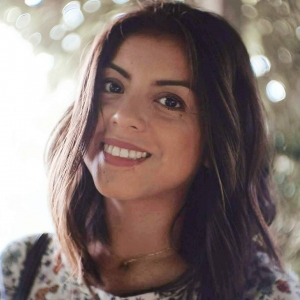Tell us a bit about yourself – what was your PhD about and where did you study?
Hola! I’m Dr. Pujada and I obtained my PhD in Molecular Cell Biology at Georgia State University. My work was about understanding the development of the ulcerative colitis disease. Patients with active ulcerative colitis have an increased risk of developing colitis-associated cancer, therefore, I was specifically researching the role of the gene Notch1 in both ulcerative colitis and colitis-associated cancer to help discover new treatments to prevent the development of this cancer.

What do you do now? What did you decide to do next after gaining your PhD?
I am a biomedical faculty, mentor, and science communicator. I decided to stay in academia after finishing my PhD because of my passion for teaching. Through all graduate school, I had the opportunity to train as an educator and this experience confirmed my decision to become an instructor right after my PhD. As a Latina in STEM, I share my knowledge through teaching to help eliminate achievement gaps due to gender, socioeconomic status, and race/ethnicity. I teach various undergraduate and graduate level courses. As a faculty member, I am also interested in promoting professional development for undergraduate/graduate students and faculty to overall improve retention in STEM.
Has having a PhD helped in developing your career? If yes, what has been the biggest impact? If no, why do you think that is?
Yes. My experience as doctoral student and lead graduate teaching assistant (TA) helped me decide to become a STEM educator. The biggest impact was my experience as a student since it made me realized that academia needed some changes to help students maximize their learning inside and outside the classroom. While being a doctoral student, I decided to work towards this goal by becoming an instructor and lead graduate TA for the introductory biology labs, where a big part of my duties was to mentor junior TAs to prepare them to lead their own teaching sections. I co-designed and co-taught inquiry-based labs and during this time I also performed preliminary studies assessing the effectiveness of using inquiry-based lab exercises at increasing student engagement. In addition, I have always been interested in incorporating methodologies to promote student engagement and cultivate equity and a defined learning environment for my students. Through these both experiences, I developed skills that translated well to instructional practice.


What’s one piece of advice that you’d offer prospective students considering a PhD?
I would advise you to clearly define your goals before considering applying – short- and long-term goals. The journey of obtaining a PhD is difficult but not impossible. If your long-term goal and dream position/job requires you to have a PhD and you think that you can fully commit yourself to a project for 3-6 years, I would say do it! BUT, also make sure you have found a well compatible Principal Investigator (PI) and mentor that fully supports your goals. A PI that will push you to your limits in order to help you grow professionally. If this is not the case, there is no need for you to be committed to one project all those years.
And what one thing would you suggest that new PhD graduates should do next?
Think about your next step but also allow yourself to take a break, you have earned it! Plan short- and long-term goals to organize your ideas. At the beginning, it will feel that everything is so uncertain, but every new journey will make you feel this way so just make sure you have a plan A, B, and C just in case. Regardless the job you take after your PhD, try to give back to the scientific community especially the young scientists. They need to know that earning a PhD is possible and accessible to anyone.

Lastly, what’s your favourite memory from your time as a PhD student?
I have a few favorites ones. From my role as a doctoral researcher, my favorite memories are in the lab working with good music and spending time with my colleagues. From my role as an instructor, my favorite memories include getting to know and provide guidance to my students.
Want to learn more about Adani?
Check out her website and follow her on Twitter and Instagram using the links below:

